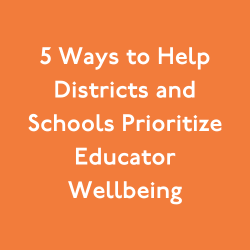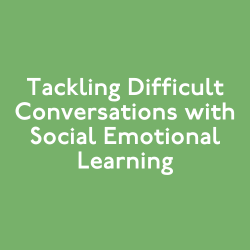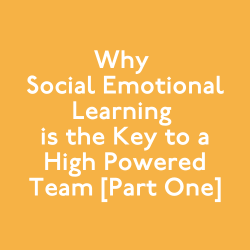In part one of our article on social emotional learning and effective teamwork, we explored why SEL is the key to highly effective teams and essential to educator wellbeing. Adult social emotional learning can help schools open up lines of communication, build supportive school communities, and uphold high expectations for everyone in the community. Internally, adult SEL will allow for greater autonomy, transparency, and accountability; further explained below.
Increased Autonomy
SEL increases teacher autonomy by teaching strategies for dealing with personal challenges and conflict. Once teachers, and teams, are equipped with skills for dealing with difficult emotions, problems can be resolved internally — without needing support from administrators. Additionally, teachers will be more able to meet their students’ needs because their needs are taken care of as well.
Greater Transparency
When SEL for teachers is a regular part of your team building, it creates transparency. For starters, it’s easier to communicate about issues we may be facing when we have a shared language to discuss it. When we don’t feel understood, it sometimes causes us to withhold information rather than go in detail or explaining every aspect of what’s bothering you. Therefore, the team is able to communicate their needs, and feel comfortable asking or offering support as needed.
Stronger Accountability
If we are able to communicate our needs to others, that offers a chance to strengthen accountability. Asking and receiving exactly what you need from a teammate goes a long way towards building a strong team. Not only is the immediate issue fixed, but trust is built within the team. It also makes it more likely that you will support another team member in return. When that happens, your team is starting to become accountable to themselves and to one another.
These three components are critical to strong teams and boosting individual performances. Ultimately, they are all rooted in trust and empathy, and adult SEL is a great way to build them.
Where can we get started? Staff meetings are an easy place to practice adult SEL and provide an opportunity to get everyone on the same page. Here are a few ideas you can implement within staff meetings, and throughout the school year, to promote adult SEL.
Activate Mirror Neurons
Mirror neurons are activated when we observe actions performed by another person. They help us process the action as well as the intention behind it. Research suggests that mirror neurons may be important for understanding and for learning new skills, as well as developing empathy (Dobbs, 2006). Try having one team member show how they’re feeling through a movement or a facial expression and everyone in the meeting mirrors that emotion. Think about wiping your eyes if you’re sad or making a fist because you’re frustrated. We’re not going to unpack the emotion at the meeting, but everyone gets an understanding of what everyone is carrying with them that day — which helps to build empathy and better support one another.
When we start reducing negative interactions and increasing positive ones, we’re on the way to building a strong team. Those actions become infectious and go a long way towards building a supportive school culture. After all, it’s much easier to care for students wellbeing when yours is being looked after as well.
Within that staff meeting concept, we’re also practicing autonomy, transparency, and accountability. Each team member was able to display their emotions in their own way, so everyone in the room understood, with the knowledge that there wouldn’t be retribution for expressing negative thoughts.
Find Time to Follow Up
Autonomy, transparency, and accountability are the essence of building trust, but follow-up is crucial. If a team member is repeatedly displaying negative emotions without any intervention from the team, it’s almost guaranteed to have consequences. That doesn’t mean convening some kind of special task force, but acknowledging one another’s feelings play a significant role. Otherwise, talking about emotions becomes a burden in and of itself. “Why should I tell you how I feel? It’s not like you care.”
Create Structures to Resolve Conflict
It’s also important to create structures for resolving conflict that are rooted in SEL when it inevitably occurs. To reduce the chances of miscommunication, we need to develop a common language around emotions. We also need to create space to reflect upon our actions without judgment, but rather to understand what happened and come to terms with the consequences for all parties. That way, we can be accountable to each other.
Continue Building Resilience
A positive consequence of practicing adult SEL in schools is the resilience built within individual team members. Equipped with strategies for self-expression, a strong support network, and tools to manage conflict, teachers now have the ability to resolve some of their emotional issues on their own. Actively promoting SEL for teachers leaves individuals inspired to work on themselves, to recognize their own emotions, and effectively communicate when they need help. In a strong, supportive environment, people aren’t afraid to take an extra moment to pause, or to ask for help when they need it.
With teacher attrition rates increasing, many educators do not feel safe and supported in their schools (Carver-Thomas & Darling-Hammond, 2017). One of the biggest reasons for leaving a job is not feeling supported (Strauss, 2017). Adult SEL is a great way to build support networks in classrooms and beyond. Adults who practice SEL model behaviors for students. It creates an emotional trickle down effect. Now, you’re building community.
The work is not easy. It’s really hard. It requires vulnerability and, in the beginning, it might feel uncomfortable. But it’s worth it.
There are few things a strong team can’t overcome. In a school community, the impact is even greater. Schools are gateways into communities, unlike many other professions. Their reach can almost be immeasurable. When teachers, administrators, and staff start taking care of one another, it creates a powerful ripple effect that may be felt for miles around and for generations to come. Students who learn emotional skills from teachers modeling appropriate behavior will handle emotional situations better than counterparts who did not.
And those students will be able to pass along the skills they’ve learned to their teams when the time comes.
Simply put: the key for strong teams in school buildings is a solid emotional foundation. Like any other skill, we have to practice it regularly. As a team. With each other. For each other.
Sign up for Move This World’s newsletter to stay up to date on social emotional learning.
Enter your email below










